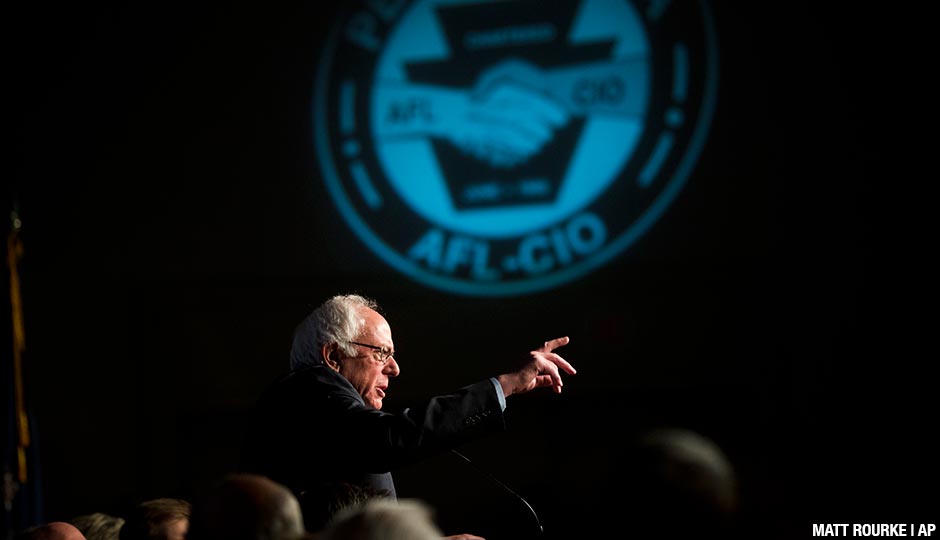4 Takeaways from Bernie Sanders’ Speech at AFL-CIO Convention

Democratic presidential candidate, Sen. Bernie Sanders, I-Vt., speaks during a campaign stop, Thursday, April 7th, at the Pennsylvania AFL-CIO Convention in Philadelphia.
After a heavy night of campaigning through the city on Wednesday, first appearing at the Tindley Temple United Methodist Church in South Philly for a discussion, and later hosting a rally at Temple University, Presidential-hopeful Bernie Sanders took the stage this morning at the AFL-CIO labor convention with the hope of securing the votes Philly’s unions as the April 26th primary approaches.
Sanders delivered a numbers-driven speech that highlighted his record of supporting unions and detailed his plan to boost the American middle class if elected. Here are a few key takeaways from his address:
1) He argues his plans for America are not “radical.”
Clinton’s speech at the AFL-CIO convention on Wednesday criticized some of Sanders’ plans as unrealistic. She argued that his numbers for closing the wage gap don’t add up and that Sanders would need Republican governors to switch camps to the progressive side in order for his policies to pass. Other critics have claimed that his policies are simply too “radical.”
That buzzword popped up a few times in Sanders speech as he insisted his plans for America were not, in fact, radical.
“It is not a radical idea, not a great socialistic idea, to say that if somebody works 40 or 50 hours a week, that person should not be living in poverty, ” said Sanders defending his policy to increase the minimum wage to $15 an hour.
Sanders also defended his plans for universal healthcare and shrinking the income gap.
“Is this really a radical idea? I don’t think so,” said Sanders who, in defending his plans to expand the national healthcare program, highlighted countries like Germany, the UK and Canada, which have already done so. “If every other major country on earth can do it, the United States of America can do it.”
He urged Americans to “not accept the status quo of where we are today as something that has to exist decade after decade.”
“I have been criticized for thinking too big, too radically,” said Sanders. “If it’s called radical to try do away with those loopholes so we can rebuild our infrastructure and create millions of jobs, you can call me a radical.”
2) No response yet on his mistaken claim that Clinton had called him “not qualified”
At Sanders’ Temple rally last night, the Vermont senator claimed that Hillary had called him “quote unquote, not qualified to be president.” At the rally, he flipped the accusation and said Clinton was unqualified because of her acceptance of special interest money through her Super PAC. This morning reports came in that Clinton had never said that — at least not directly.
Many were wondering if Sanders would address the comments today. While Sanders tap-danced around the question earlier in the day, he remained mute on the subject here; he did again emphasize that he is the only candidate who does not have a Super PAC. He highlighted that he has raised a large chunk of his funds (over $6 million) from individual campaign contributions, averaging $27 each.
“I will not leave here this morning and go to a Wall Street fundraiser, I will not be hustling money from the wealthy and the powerful,” said Sanders. “I grew up in a sense in this movement, you are my family and we will win or loss this campaign on the backs of working families.”
3) Differences between him and Clinton
Sanders voiced a few distinctions between himself and Clinton. Firstly, that he supports lifting the cap on taxable income in order to expand Social Security. He argued that if the cap was lifted starting at $250,000 and above, the lifetime of Social Security could be extended by 58 years.
The second point he bought up was that he opposes trade agreements. He mentioned the 1994 North American Free Trade Agreement and others, which he argued sent millions of American jobs overseas. “Not only did I vote against all these disastrous trade agreements, I helped lead the opposition to all of them,” Sanders said.
Clinton voiced a similar sentiment at her address the day prior, she argued that she will reject any trade deal that will hurt America, in addition to confronting China on its trade practices.
4) Bernie’s working class roots
Sanders began his speech by describing his childhood growing up in a three-and-a-half room, rent-controlled apartment in Brooklyn. “Every day there was tension in the house — as is the case with millions of other families — about what you buy and what you don’t buy,” Sanders said.
He said his upbringing provided him with his first lessons in economics. In addition, that his past allows him to understand the realities of millions of families who struggle with similar circumstances. In order to confront the growing disparity between the 1 percent and the bottom 90 percent of Americans and rebuild the middle class, Sanders says what America needs is “a political revolution.”
—
The AFL-CIO decided in February to hold off on endorsing a Presidential candidate, leaving a lot of important votes up for grabs. Influential Philly union leader John Dougherty told CBS3 that he’s unsure whether his union will make an endorsement before the primary, adding that race itself has been beneficial to unions.
“Both Hillary and Bernie and the energy that’s involved in the campaign is a marketing tool for unions,” Dougherty said to CBS 3.
Follow @MariamDembele on Twitter.


